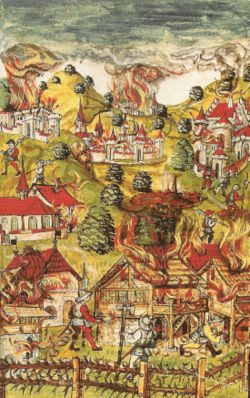
Diebold Schilling the Younger
Encyclopedia

Luzerner Schilling
The Luzerner Schilling is an illuminated manuscript of 1513, containing the chronicle of the history of the Swiss Confederation written by Diebold Schilling the Younger of Lucerne....
", one of the Swiss illustrated chronicles
Swiss illustrated chronicles
Several illustrated chronicles were created in the Old Swiss Confederacy in the 15th and 16th centuries. They were luxurious illuminated manuscripts produced for the urban elite of Bern and Lucerne, and their copious detailed illustrations allow a unique insight into the politics and daily life of...
, which he presented to the city council of Lucerne
Lucerne
Lucerne is a city in north-central Switzerland, in the German-speaking portion of that country. Lucerne is the capital of the Canton of Lucerne and the capital of the district of the same name. With a population of about 76,200 people, Lucerne is the most populous city in Central Switzerland, and...
on 15 January 1513 (but which remained incomplete). He was the nephew of Diebold Schilling the Elder
Diebold Schilling the Elder
Diebold Schilling the Elder was the author of several of the Swiss illustrated chronicles, the "Berner Schilling of 1483, the "Spiezer Schilling" , and the "Zürcher Schilling" of 1484....
of Berne
Berne
The city of Bern or Berne is the Bundesstadt of Switzerland, and, with a population of , the fourth most populous city in Switzerland. The Bern agglomeration, which includes 43 municipalities, has a population of 349,000. The metropolitan area had a population of 660,000 in 2000...
. The younger Diebold was a somewhat scandalous figure, not unlike his father Hans, brother to the elder Diebold, an adventurer who had sought his fortune at the court of Matthias Corvinus, and returned destitute in 1488. Diebold was a secretary in Lucerne from 1479, and received the priesthood in 1481. His behaviour was so unpriestly, however, that the city council locked him into the tower in 1487, where he remained imprisoned for two years before he was released on parole of exhibiting more appropriate behaviour in the future. After his release he was soon back to his old ways, and after he had killed a man after a tavern brawl, he was fined and obliged to read a mass for his victim every year. Diebold was fiercely anti-French, and he accused the Bernese in particular, as well as his fellow chronicler Petermann Etterlin
Petermann Etterlin
Petermann Etterlin was born in Lucerne as the son of Egloff Etterlin, who served as chronicler of the city of Lucerne from 1427 to 1453. Although his parents had destined him for an ecclesiastical career, Etterlin never became a clergyman...
because of their friendly attitude towards France. Diebold's own sympathies lay with the German emperor Maximilian I
Maximilian I, Holy Roman Emperor
Maximilian I , the son of Frederick III, Holy Roman Emperor and Eleanor of Portugal, was King of the Romans from 1486 and Holy Roman Emperor from 1493 until his death, though he was never in fact crowned by the Pope, the journey to Rome always being too risky...
, who personally invited him to the Reichstag
Holy Roman Empire
The Holy Roman Empire was a realm that existed from 962 to 1806 in Central Europe.It was ruled by the Holy Roman Emperor. Its character changed during the Middle Ages and the Early Modern period, when the power of the emperor gradually weakened in favour of the princes...
in Konstanz
Konstanz
Konstanz is a university city with approximately 80,000 inhabitants located at the western end of Lake Constance in the south-west corner of Germany, bordering Switzerland. The city houses the University of Konstanz.-Location:...
in 1507. As an author, Diebold's most important contribution to the historiography of his times is his account of the years 1507–1509, the events of which he tells in his own words as an eye-witness.

